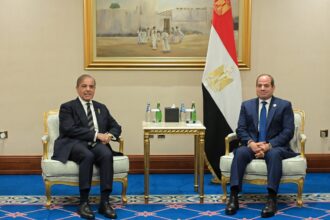CAIRO: U.S. Secretary of State Condoleezza Rice will meet foreign ministers of the six conservative Gulf countries and Jordan while in Egypt on Tuesday, an Egyptian official said on Friday. Apart from her bilateral meetings with President Hosni Mubarak and Foreign Minister Ahmed Abul-Gheit, she will take part in a nine-way meeting with ministers from Bahrain, Egypt, Jordan, Kuwait, Oman, Qatar, Saudi Arabia and the United Arab Emirates, said the official, who asked not to be named. The Egyptian state newspaper Al-Ahram said the meeting would talk about how to revive Middle East peace talks.
With the United States under intense pressure from its European and Arab allies to do more to revive peace efforts, Rice will leave Sunday. State Department spokesman Sean McCormack was quick to play down the ambitions for Rice s trip, saying the focus would be consultations rather than big decisions. This is a trip designed to lay the foundations, potentially, for moving the process forward. There aren t any guarantees in that regard, he said. The decision to dispatch Rice to the region followed a new show of impatience with President George W. Bush s administration, which is seen to have neglected the Israeli-Palestinian crisis as he focused on toppling Saddam Hussein s regime in Iraq and the broader war on terrorism. At the UN General Assembly last week in New York, Rice and Bush heard one world leader after another appeal for renewed action, saying the festering Israeli-Palestinian conflict lay at the root of global instability and terrorism. Bush for his part offered a minor initiative involving Rice working with Arab allies to strengthen Palestinian security services loyal to the moderate Palestinian Authority President Mahmoud Abbas – a task she will follow up on this trip, McCormack said. But the spokesman held out little hope for any significant progress in ending the deadlock that has gripped Israeli-Palestinian dealings since the radical Hamas movement took control of the Palestinian government in March. Scant details were provided for Rice s agenda, which includes meetings with Abbas and Israeli Prime Minister Ehud Olmert, a U.S. ally in need of support following his government s perceived mishandling of the recent war with the Hezbollah militia in Lebanon. Although Olmert told Israeli radio earlier Thursday that he planned in the coming days to hold his first direct meeting with Abbas since June, McCormack said there were no plans yet for Rice to make that a three-way encounter. Abbas has been trying to form a unity government between his moderate Fatah Party and Hamas in hopes of ending Western sanctions and renewing negotiations with Israel on the creation of a Palestinian state. Israel and the West have suspended essential financial support to the Hamas government, plunging the Palestinian territories into dire hardship but also weakening public support for the Islamist movement, according to U.S. officials. The United States and its major power allies have said they would lift the aid restrictions only once a Palestinian government recognizes Israel s right to exist, renounces violence and abides by past peace accords. While Abbas has vowed to meet those conditions, Hamas, which Washington and the European Union consider a terrorist organization, has rejected them. Rice this week blamed Hamas hardliners based in Damascus for torpedoing the Abbas initiative and suggested more moderate Hamas leaders could emerge in the Palestinian territories. But McCormack ruled out any possible contact between Rice and Hamas leaders as long as they continue rejecting the three principles laid down by the United States, United Nations, European Union and Russia – the so-called Quartet on peace negotiations. We re not talking to Hamas, and we re not going to talk to Hamas, he said. McCormack said Rice would consult with leaders who have a vision for a more moderate, peaceful, democratic, stable and prosperous Middle East. Topics would include the stand-off with Iran over its suspected nuclear weapons program, the situation in Lebanon following the recent war between Israel and the Hezbollah militia, and broader issues of security in terrorism, he said. Agencies
